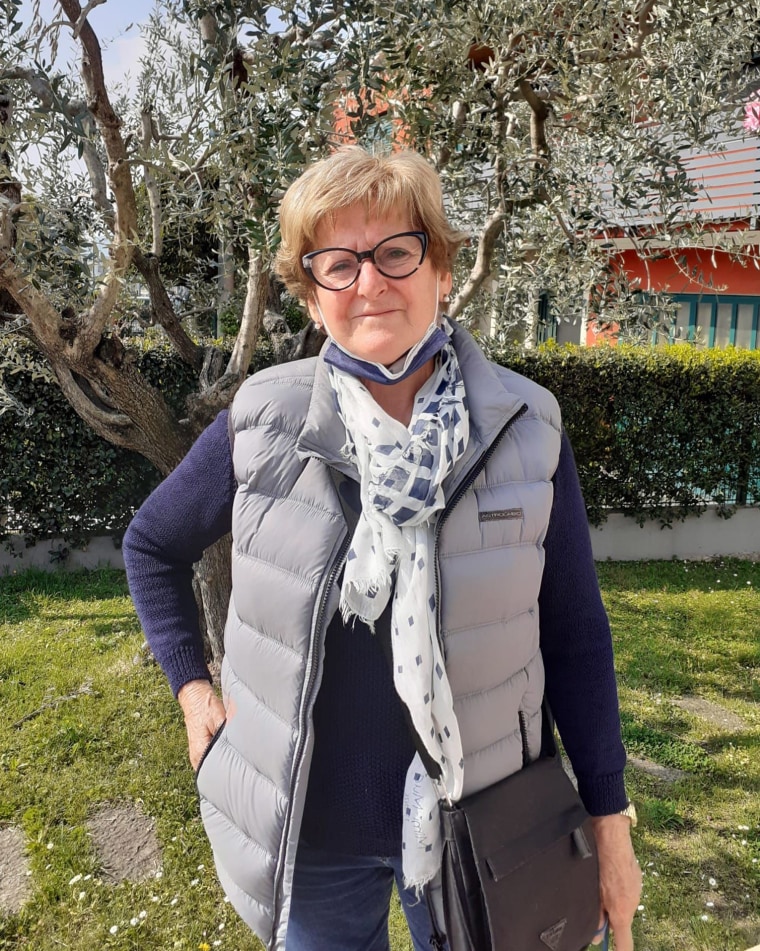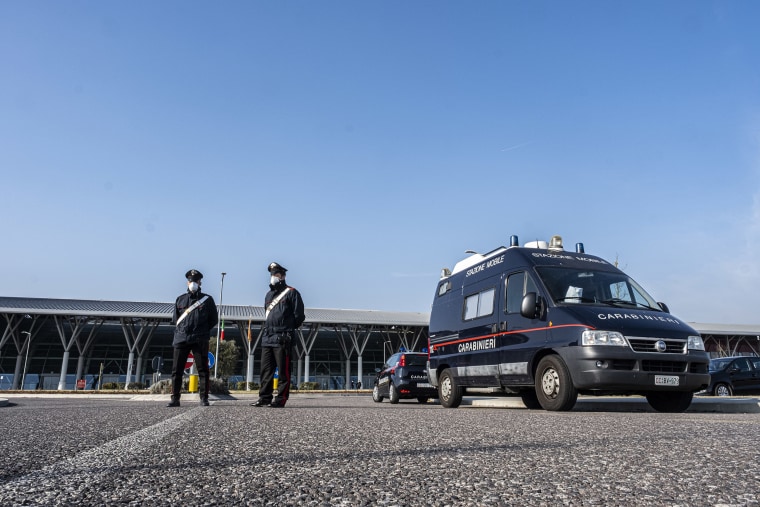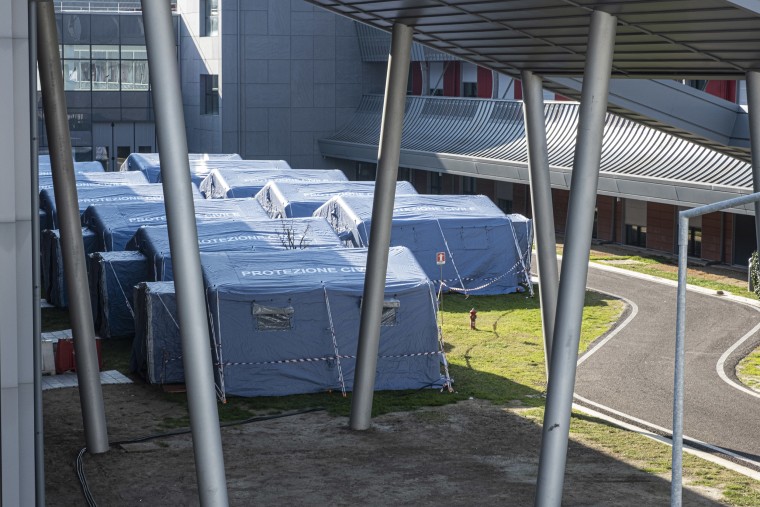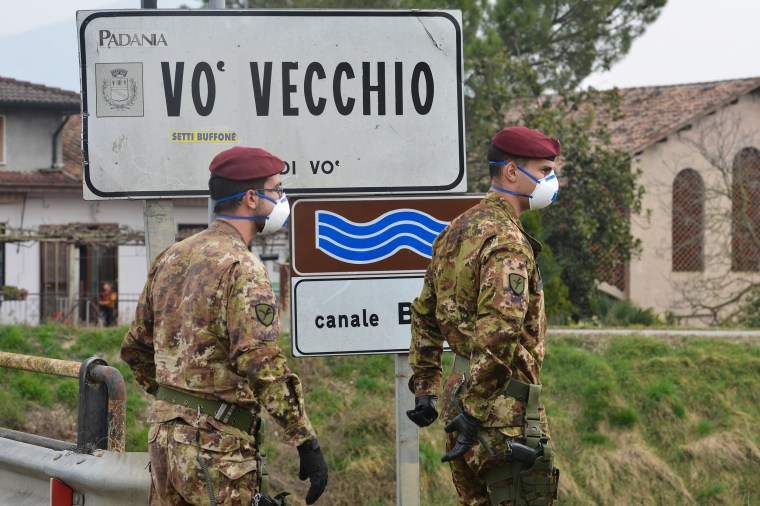LONDON — Paola Bezzon thought her sniffles in December were just a seasonal cold until a serology test months later found coronavirus antibodies in her blood.
And not just normal levels of antibodies. Researchers say she is "super-immune" — a person whose body seems to make more antibodies than normal.
"I don't know why I have all these antibodies, but they are such a lifeline for me," she said. "They make me feel safe even though I haven't had the vaccine yet."
Bezzon, 68, lives in Vo', a town of about 3,300 people west of Venice, which became one of the first cities outside China to experience a Covid-19 outbreak — and the site of the first Covid-19 death in Europe. Researchers, hoping to understand the virus and the human immune response to it, arrived shortly after.
What they've found sparked interest in why some people seem to be able to ward off the virus long after initial exposure. According to a coming study by researchers from the University of Padua in collaboration with Imperial College London, of the 129 people who still had antibodies nine months on from the initial outbreak, 16 showed more than double the levels they had in May. Among the possible causes of the rise in antibodies is re-exposure to the virus. The study is undergoing peer review.

Vo's mayor, Giuliano Martini, said virus fighting is woven into the history of the town.
In the 14th century, ships arriving in Venice from areas believed to be plague-infested had to wait 40 days – "quaranta"in Italian — before landing. That's how the concept of "quarantine" was born.
Two centuries later, the ever-expanding commerce and military forces of Venice reclaimed marshy and unproductive land 40 miles to its west. Vo' was born, but it remained largely unknown — more a place to travel through to and from Venetian ports and the Italian inland.
The relative anonymity ended Feb. 21, 2020, when Vo' registered Europe's first official Covid-19-related death. The town was swiftly put in lockdown.
Soon after, Enrico Lavezzo, a professor in the department of molecular medicine at the University of Padua, 20 miles northeast of Vo', and his team asked whether the townspeople would agree to additional testing.
Lavezzo, a microbiologist, has since mass-tested the people of Vo' three times.
"We discovered the presence of antibodies still in late November, nine to 10 months from the initial infection, the longest span of time of antibody presence that had ever been detected during the pandemic so far," he said.

While so-called super-immunes have been found in other parts of the world, it's rare for people's antibodies to increase instead of dissipate.
Understanding how to trigger such a response could be critical in defeating Covid-19.
"A vaccine is an artificial exposure to a pathogen," Lavezzo said. "It's like promoting the immune memory of those who get vaccinated, so next time they get in contact with the virus, their response can be faster and stronger."
The discovery of super-immunes isn't the first study from Vo' to offer insight into the coronavirus.
In March 2020, when the majority of the world still saw Covid-19 as a virus affecting far-flung populations, Lavezzo and other researchers found that 42.5 percent of the infected people in Vo' were asymptomatic. The finding influenced the region of Veneto, where Vo' is located, and the rest of Italy in their efforts to test, trace and isolate the virus.
Martini, the mayor, said he believes it was a call of duty and a desire for redemption that made the population respond en masse to testing.
For months after the initial lockdown, no one dared to come to the village, he said — the community was scarred with the reputation of "untori," or plague spreaders.

The local council telephone line dedicated to assisting the population was getting overwhelmed by threatening calls.
"Our neighbors would call shouting — telling us to remain in our town, that we were not welcomed anymore," said Erika Polito, a member of the council and of the initial task force response.
From plague spreaders to its high concentration of super-immunes, Vo' enjoys a newfound fame thanks to its willingness to show up for studies.
Of 3,300 people in Vo', around 2,800 participated in the rounds of testing. Raffaella Frasson, 53, will show up for the next one, as well, to see whether, as one of the super-immunes, she continues to have elevated antibody levels.
As the vaccine rollout lags behind schedule in Italy, Frasson still isn't eligible for the first dose, and she wishes her antibodies could be handier.
"If there was such a thing as an antibody passport, I would grab it and go," she said. "I want to travel and enjoy my life. We have already lost so much time because of this."
Frasson's antibodies aren't the only thing under scrutiny.
Among the data Lavezzo's team is collecting is the genetic map of the population to see whether something in their DNA is helping fend off the virus.
That's something the mayor suspects could help shine a light on the area's elevated number of super-immune. He noted that the town's population is mostly from a handful of families.
Even though Lavezzo is skeptical, the townspeople who spoke with NBC News expressed pride and curiosity to see the results. "It's a mechanism written in our DNA," Martini said.
